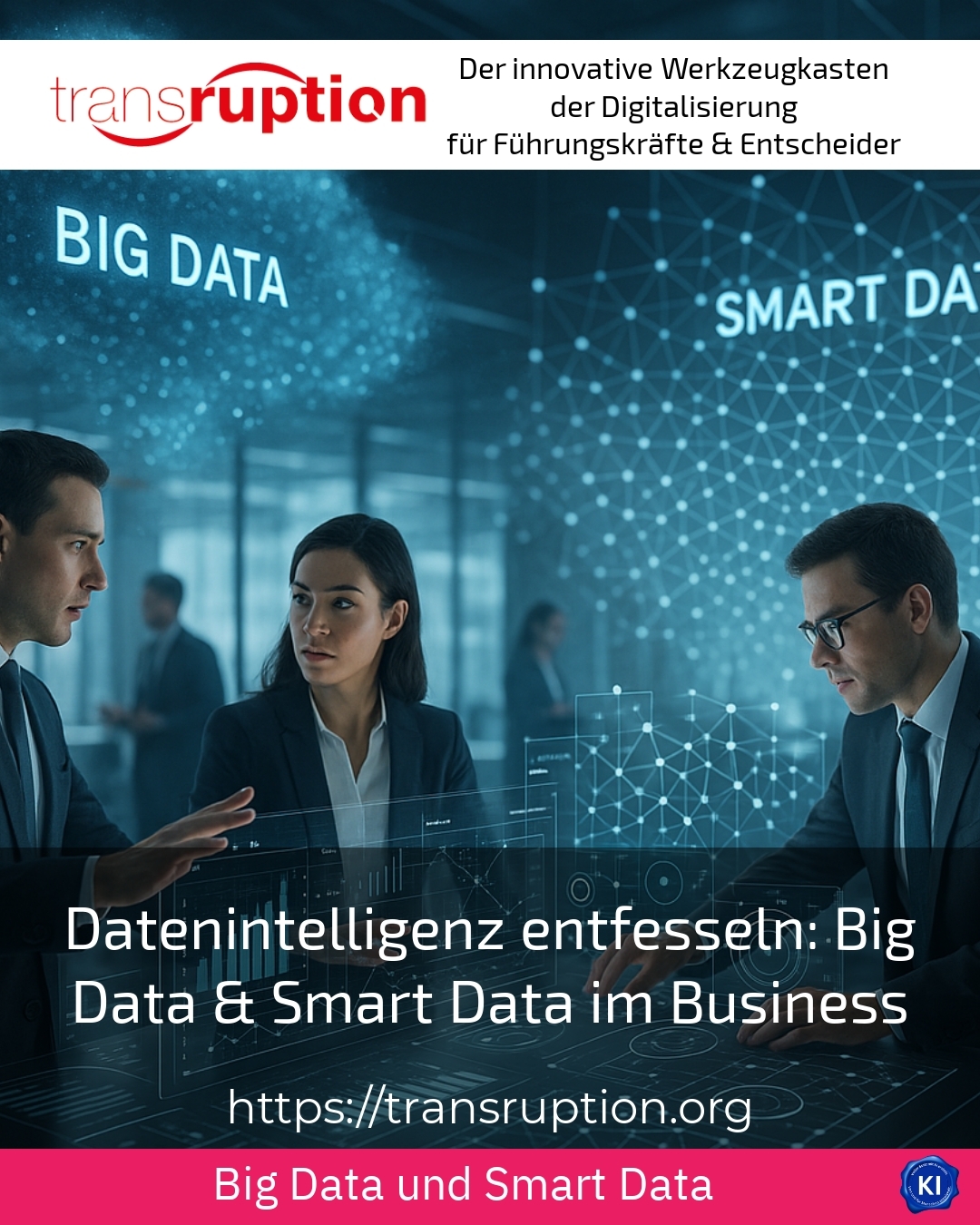In today's corporate world Data intelligence is playing an increasingly central role. With the exponentially growing amount of digital information, it is crucial to generate usable smart data from big data. This enables better decisions to be made and innovative projects to be supported on a sound basis. But Data intelligence means much more than just collecting data: It is about understanding, structuring and utilising information in a targeted manner.
Data intelligence as the key to optimising business processes
Companies sometimes store enormous amounts of data from various sources, such as machine control systems, customer interactions and supply chains. Big data as a raw material alone offers no added value if it is not structured or analysed. Data intelligence uses data preparation methods to create smart data - precise, verified and relevant information for specific questions.
In the manufacturing industry, companies analyse sensor data from production facilities in order to detect wear at an early stage, for example. Delivery logistics companies network freight data globally in order to plan routes more efficiently. Banks, on the other hand, use Data intelligence, to identify market trends and dynamically adjust investment portfolios. These examples show how different sectors benefit from the findings.
A marketing agency that uses customer and web data to automatically optimise campaigns can reduce wastage and personalise the approach. This increases the conversion rate because offers are more customised. In the automotive industry, vehicle data is used to plan maintenance in advance and minimise downtime.
Data intelligence in practical use - integration of big data and smart data
Core from Data intelligence is the intelligent processing of large, heterogeneous amounts of data. Artificial intelligence and machine learning analyse patterns and make predictions. This transforms the mass of raw data into strategic resources. A typical application scenario can be found in the energy industry, where electricity consumption and grid load data is analysed in real time in order to forecast and better manage peaks.
In retail, evaluations of customer purchasing behaviour enable the dynamic adjustment of product ranges and offers. This ensures greater customer satisfaction and better sales. Data-driven models also ensure improved risk assessments and compliance in the financial sector.
The automation of data processes with the help of data intelligence platforms ensures that information is always up-to-date, reliable and accessible. This replaces manual analyses in large companies and allows decisions to be based on valid data.
BEST PRACTICE at the customer (name hidden due to NDA contract) A leading e-commerce provider set Data intelligence to extract individual purchasing patterns from huge customer data sets. This resulted in personalised recommendation algorithms that significantly increased sales in the online shop and improved customer loyalty.
Impulses for the implementation of data-intelligent solutions
Every company should first clearly identify its data sources and check which information in them is meaningful. The implementation of modern analysis tools and automation techniques are crucial in order to cope with the flood of data. It is worthwhile hiring experts for Data intelligence The company can also draw on the services of experts who can assist with the development of customised concepts and employee training.
It is also advisable to set up flexible data management that takes both big data and smart data into account. This allows data sources to be continuously updated and utilised for different business areas. The use of AI methods also offers valuable advantages for recognising patterns and refining forecasts.
Another practical tip is to start small pilot projects to test the use of data analyses in your own environment. Building on this, optimisations can be gradually expanded and adapted to specific requirements.
Data intelligence to support projects and decisions
Many companies turn to specialised coaches when faced with challenges in the implementation of data-driven projects. For example, they assist with the selection of suitable technologies, help with integration into existing processes and provide impetus for cultural change towards a more data-conscious way of working.
This is how Data intelligence not just a tool for analyses, but a strategic companion for future-oriented corporate management. In particular, projects that want to promote innovation or digitally transform operational processes benefit greatly from expert support.
BEST PRACTICE at the customer (name hidden due to NDA contract) In an industrial group, a data intelligence coach supported the project-related integration of machine learning models into quality control. This made it possible to reduce error rates and automate processes without disrupting day-to-day operations.
BEST PRACTICE at the customer (name hidden due to NDA contract) A logistics company benefited from data-intelligent support in order to manage its distribution routes more efficiently with the help of real-time data. Automated alerts were created in the event of deviations, which significantly improved delivery punctuality.
My analysis
To summarise, it can be said that Data intelligence forms an essential foundation for creating real competitive advantages from the mass of available data. It is not the mere collection of data that makes the difference, but the intelligent refinement of information and its utilisation for specific actions. Successful companies use data-intelligent concepts to optimise processes, understand customers better and identify market opportunities at an early stage. Ultimately, targeted support during the implementation of projects can support success by providing valuable impetus.
Further links from the text above:
What is Data Intelligence? | Actian
Understanding data better with data intelligence - BARC
What is Data Intelligence? Advantages, application & best practices - DATA MART
What is Data Intelligence? - IBM
What is Data Intelligence and what does it mean? - Zeenea
Big data & smart data for smart decisions - Sauldie
Data intelligence or the art of turning data into gold - DataScientest
Unleashing data intelligence: Big Data & Smart Data for Business - Sauldie
For more information and if you have any questions, please contact Contact us or read more blog posts on the topic TRANSRUPTION here.















